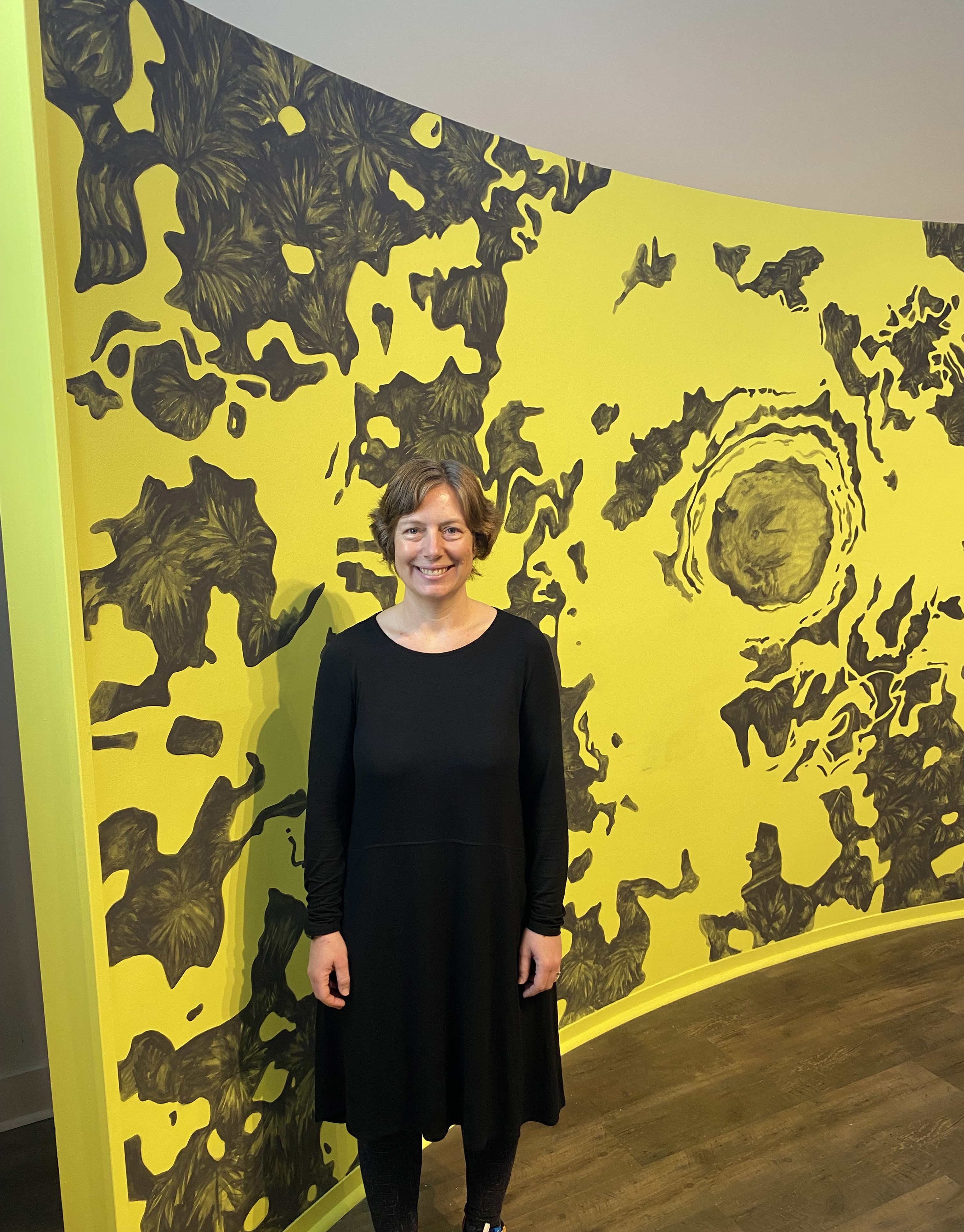Museum of the White Mountains Director
Meghan Doherty

Museum of the White Mountains Director Megan Doherty stands in front of a painting by Rita Leduc as part of the ‘Extending Ecology’ exhibit, which helps to ‘shift our understanding of our place within the context of the White Mountains.’ Meghan Doherty, the director of the Museum of the White Mountains in Plymouth, is proof that you can go home again. The small-town North Country native went to college at the University of Chicago and then got a Ph.D. in art history at the University of Wisconsin. She then ran the art galleries and taught art history at Berea College, a small liberal arts institution in Kentucky, before happily returning to oversee the Museum of the White Mountains in early 2022.
“I grew up in Dummer (north of Berlin, population around 300), and the White Mountains have always loomed large in my life,” Doherty said. Though she loved her work at Berea, she realized “I missed the mountains” and was happy to return to New Hampshire to share her enthusiasm about the majestic beauty and multi-faceted ecological importance of the White Mountains.
“It definitely felt like a homecoming,” she said.
The museum, which celebrated its 10th anniversary in 2023, was closed for 18 months during the COVID pandemic, but Doherty said patrons have returned in record numbers. She talked to NH Business Review about the wholistic importance of the museum and its latest exhibition, an interdisciplinary merging of art and environmental science titled “Extending Ecology: Making Meaning with the White Mountains.”
Q. What makes the Extending Ecology exhibition unique?
A. First of all, the exhibition is the result of a two-year collaboration between an ecologist, artist and a forest: ecologist and cultural communicator Rich Blundell, artist Rita Leduc, and research from the Hubbard Brook Experimental Forest. While I researching for an exhibition, I was taken aback by their clear devotion to the place we call the White Mountains.
Second, this is an exhibition about relationships: the relationship between collaborators Leduc and Blundell; the relationship between their research and our museum at Plymouth State University; and the relationship between all of us and the White Mountains.
Q. What is the “making meaning” aspect of the exhibition?
A. We’re at an exciting crossroads of science, art and creative meaning-making at the Museum of the White Mountains. We’re investigating the ways in which we can shift our understanding of our place within the context of the White Mountains.
For example, the research being done at the Hubbard Brook Experimental Forest (within the White Mountain National Forest) is regarded highly in environmental research circles for its work on how climate and other disruptions impact the forest, but it’s not well known in New Hampshire.
We really want to emphasize thinking not only about the past of the White Mountains but its present and future. In particular, we hope people will think a lot about what’s happening in the moment due to the ripple effects of climate change.
We hope to encourage new perspectives and conversations on how humanistic inquiry can further sustainability goals. I don’t believe we can understand the significant economic and environmental drivers of the changes that are happening if we only think about one aspect.
Q. What might people who don’t know about the museum be surprised to learn?
A. The theme here is focused on a place, so we aren’t your typical art or history museum. The genesis came in 2010 when the late White Mountain photographer Dan Noel gave his voluminous collection of photographs and materials to Plymouth State. (The museum is affiliated with and partially funded by Plymouth State University.) This was our founding collection and it led to others.
Since then, the museum has become a repository of the unique historical, cultural and environmental legacy of the region. We provide archival access to the growing number of collections of photographs, paintings, journals, maps and books to researchers, students and the public.
“Extending Ecology: Making Meaning with the White Mountains” runs now through Dec. 15. The 2023-2024 Mountain Voices lecture series is focused on conservation of the White Mountains and runs monthly through April 11.
Find out more at Plymouth.edu/mwm.